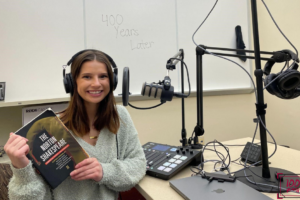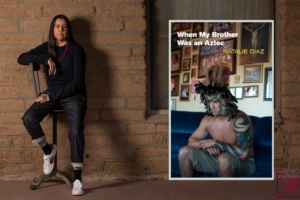 Kelly Kramer
Kelly Kramer
Zeta Tau Chapter
Liberty University, Lynchburg, VA
It’s Thanksgiving. If I’m lucky, I’m being interviewed by well-meaning family members; if not, it’s my college roommate’s family. Regardless, when they hear I’m an English major, they want to know if I’m writing a book, which reminds me that, again, I’ve been too scared to try NaNoWriMo this year. I scramble to sound like a normal person, because it’s hard to talk to people who aren’t habitually reading six books at once and daily scribbling down notes for their next project. I like to tell people I love stories, implying we definitely can talk about Twenty One Pilots and the new Star Wars film, and they don’t have to pretend to be interested in my odd niche of the world. Also, that I am open-minded, cool, and mysteriously in-the-know about all creative mediums.
 Really, that’s why the new, sexy topics for English students are films, TV shows, and song lyrics: It’s just where our culture is headed. We can’t be too academic about it, or we’ll get behind the times. I’d know. At my Sigma Tau Delta induction the professor talked more about Terrence Malick’s film The Tree of Life and some rap lyrics by Kendrick Lamar than more traditional literature. What matters isn’t the medium so much as what kind of stories are shaping the world. If more people watch Memento than read Metamorphosis, then that’s where we, English majors, the expert analysts of culture, need to be headed.
Really, that’s why the new, sexy topics for English students are films, TV shows, and song lyrics: It’s just where our culture is headed. We can’t be too academic about it, or we’ll get behind the times. I’d know. At my Sigma Tau Delta induction the professor talked more about Terrence Malick’s film The Tree of Life and some rap lyrics by Kendrick Lamar than more traditional literature. What matters isn’t the medium so much as what kind of stories are shaping the world. If more people watch Memento than read Metamorphosis, then that’s where we, English majors, the expert analysts of culture, need to be headed.
Lies.
Story medium totally changes what kind of stories are told. No one’s ever said the story that reaches the most people wins. With a film, you have a massive group of people, all working together to create a thing. The final product can be pretty ambitious, with many different components, like acting and cinematography. A written product, while still just as complex (take Tolkien, for instance), only needs one creator. You can build a whole world independently, a whole philosophy, and pass it on.
When you interact with the written page, you feel like you’re about to respond, that the person across the table from you is waiting for your answer. If it existed as a song lyric, you’d be tempted to sing along, to identify with the speaker instead of giving her an answer. And, if you saw it as a line of dialogue in a play or a film, you’d be tempted to watch, as an outside observer. Writing encourages your reader to interact with you, almost personally.
Today, the form of writing might appear to limit your audience; however, it also opens up incredible possibilities. If you’re frustrated by sexist rappers or screenplay writers, there’s not a lot you can change by yourself in that field. But, with the written word, you can do something. Frustrated about your school? Critiquing the latest blockbuster? Analyzing your home culture? You can do this with the written word, and you don’t need an army to back you up. In fact, writing is the best tool for metaphorically raising an army, because it gives one person the ability to approximate a conversation with their audience.
 I’m not trying to say English majors should isolate themselves from other creative mediums. However, we have to interact humbly and cautiously. All mediums are not created equally. We’re probably hopelessly out of our depth when it comes to story beats and lighting and cinematography. Just keep writing! If this is what you’ve chosen, don’t be embarrassed about it. Whether you’re analyzing great writing, or doing it yourself, you belong to a glorious tradition of shared opportunity: self-expression. So, don’t stop writing. Love the experience, with deletions and writers block and overdosing on coffee. Embrace it.
I’m not trying to say English majors should isolate themselves from other creative mediums. However, we have to interact humbly and cautiously. All mediums are not created equally. We’re probably hopelessly out of our depth when it comes to story beats and lighting and cinematography. Just keep writing! If this is what you’ve chosen, don’t be embarrassed about it. Whether you’re analyzing great writing, or doing it yourself, you belong to a glorious tradition of shared opportunity: self-expression. So, don’t stop writing. Love the experience, with deletions and writers block and overdosing on coffee. Embrace it.
How do you plan to field questions about your English major this holiday season?





Add Comment